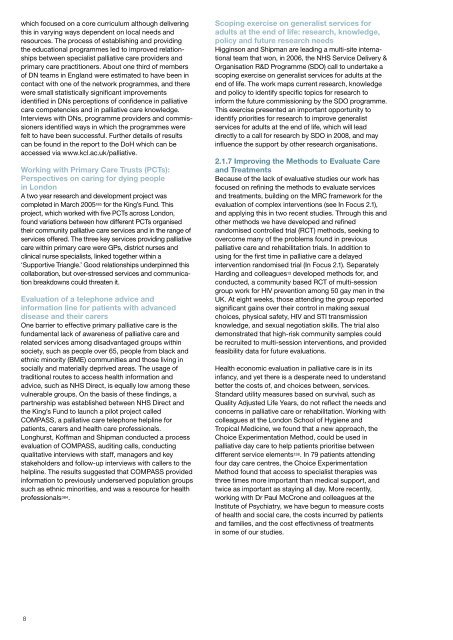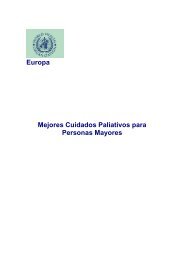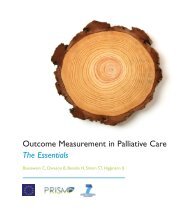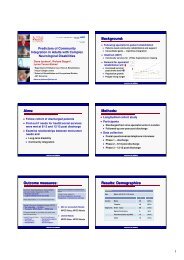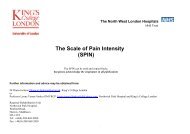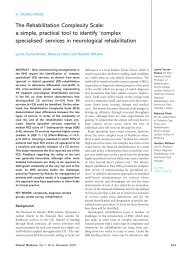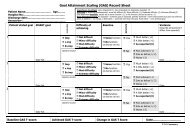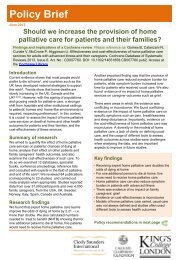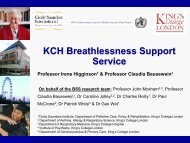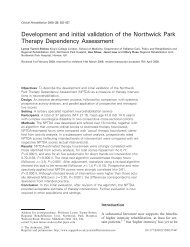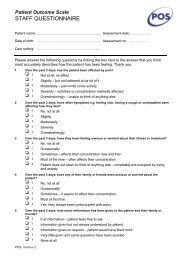2004 - 2007 - Cicely Saunders Institute - King's College London
2004 - 2007 - Cicely Saunders Institute - King's College London
2004 - 2007 - Cicely Saunders Institute - King's College London
Create successful ePaper yourself
Turn your PDF publications into a flip-book with our unique Google optimized e-Paper software.
which focused on a core curriculum although delivering<br />
this in varying ways dependent on local needs and<br />
resources. The process of establishing and providing<br />
the educational programmes led to improved relationships<br />
between specialist palliative care providers and<br />
primary care practitioners. About one third of members<br />
of DN teams in England were estimated to have been in<br />
contact with one of the network programmes, and there<br />
were small statistically significant improvements<br />
identified in DNs perceptions of confidence in palliative<br />
care competencies and in palliative care knowledge.<br />
Interviews with DNs, programme providers and commissioners<br />
identified ways in which the programmes were<br />
felt to have been successful. Further details of results<br />
can be found in the report to the DoH which can be<br />
accessed via www.kcl.ac.uk/palliative.<br />
Working with Primary Care Trusts (PCTs):<br />
Perspectives on caring for dying people<br />
in <strong>London</strong><br />
A two year research and development project was<br />
completed in March 2005 185 for the King’s Fund. This<br />
project, which worked with five PCTs across <strong>London</strong>,<br />
found variations between how different PCTs organised<br />
their community palliative care services and in the range of<br />
services offered. The three key services providing palliative<br />
care within primary care were GPs, district nurses and<br />
clinical nurse specialists, linked together within a<br />
‘Supportive Triangle.’ Good relationships underpinned this<br />
collaboration, but over-stressed services and communication<br />
breakdowns could threaten it.<br />
Evaluation of a telephone advice and<br />
information line for patients with advanced<br />
disease and their carers<br />
One barrier to effective primary palliative care is the<br />
fundamental lack of awareness of palliative care and<br />
related services among disadvantaged groups within<br />
society, such as people over 65, people from black and<br />
ethnic minority (BME) communities and those living in<br />
socially and materially deprived areas. The usage of<br />
traditional routes to access health information and<br />
advice, such as NHS Direct, is equally low among these<br />
vulnerable groups. On the basis of these findings, a<br />
partnership was established between NHS Direct and<br />
the King’s Fund to launch a pilot project called<br />
COMPASS, a palliative care telephone helpline for<br />
patients, carers and health care professionals.<br />
Longhurst, Koffman and Shipman conducted a process<br />
evaluation of COMPASS, auditing calls, conducting<br />
qualitative interviews with staff, managers and key<br />
stakeholders and follow-up interviews with callers to the<br />
helpline. The results suggested that COMPASS provided<br />
information to previously underserved population groups<br />
such as ethnic minorities, and was a resource for health<br />
professionals 384 .<br />
Scoping exercise on generalist services for<br />
adults at the end of life: research, knowledge,<br />
policy and future research needs<br />
Higginson and Shipman are leading a multi-site international<br />
team that won, in 2006, the NHS Service Delivery &<br />
Organisation R&D Programme (SDO) call to undertake a<br />
scoping exercise on generalist services for adults at the<br />
end of life. The work maps current research, knowledge<br />
and policy to identify specific topics for research to<br />
inform the future commissioning by the SDO programme.<br />
This exercise presented an important opportunity to<br />
identify priorities for research to improve generalist<br />
services for adults at the end of life, which will lead<br />
directly to a call for research by SDO in 2008, and may<br />
influence the support by other research organisations.<br />
2.1.7 Improving the Methods to Evaluate Care<br />
and Treatments<br />
Because of the lack of evaluative studies our work has<br />
focused on refining the methods to evaluate services<br />
and treatments, building on the MRC framework for the<br />
evaluation of complex interventions (see In Focus 2.1),<br />
and applying this in two recent studies. Through this and<br />
other methods we have developed and refined<br />
randomised controlled trial (RCT) methods, seeking to<br />
overcome many of the problems found in previous<br />
palliative care and rehabilitation trials. In addition to<br />
using for the first time in palliative care a delayed<br />
intervention randomised trial (In Focus 2.1). Separately<br />
Harding and colleagues 13 developed methods for, and<br />
conducted, a community based RCT of multi-session<br />
group work for HIV prevention among 50 gay men in the<br />
UK. At eight weeks, those attending the group reported<br />
significant gains over their control in making sexual<br />
choices, physical safety, HIV and STI transmission<br />
knowledge, and sexual negotiation skills. The trial also<br />
demonstrated that high-risk community samples could<br />
be recruited to multi-session interventions, and provided<br />
feasibility data for future evaluations.<br />
Health economic evaluation in palliative care is in its<br />
infancy, and yet there is a desperate need to understand<br />
better the costs of, and choices between, services.<br />
Standard utility measures based on survival, such as<br />
Quality Adjusted Life Years, do not reflect the needs and<br />
concerns in palliative care or rehabilitation. Working with<br />
colleagues at the <strong>London</strong> School of Hygiene and<br />
Tropical Medicine, we found that a new approach, the<br />
Choice Experimentation Method, could be used in<br />
palliative day care to help patients prioritise between<br />
different service elements 138 . In 79 patients attending<br />
four day care centres, the Choice Experimentation<br />
Method found that access to specialist therapies was<br />
three times more important than medical support, and<br />
twice as important as staying all day. More recently,<br />
working with Dr Paul McCrone and colleagues at the<br />
<strong>Institute</strong> of Psychiatry, we have begun to measure costs<br />
of health and social care, the costs incurred by patients<br />
and families, and the cost effectivness of treatments<br />
in some of our studies.<br />
8


